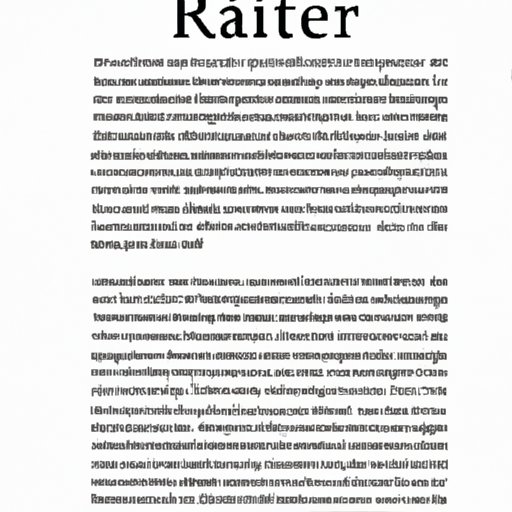Introduction
Writing a research paper is an essential part of academics and should not be avoided on account of one’s anxiety. In fact, the process of writing a research paper can be one of the more rewarding experiences one may encounter in academics. What is a research paper? A research paper is essentially an expanded essay that presents your own interpretation or evaluation or argument. When you write an essay, you use everything that you personally know and have thought about a subject. When you write a research paper you build upon what you know about the subject and make a deliberate attempt to find out what experts know.

Definition of a Research Paper
A research paper is an academic document that is based on the author’s original research on a particular topic and the analysis and interpretation of the research findings. It can be either a term paper, a master’s thesis or a doctoral dissertation. This type of document requires extensive research and analysis, which needs to be conducted with much attention to detail. The goal of a research paper is to bring together different views, evidence, and facts about a topic from books, articles, and interviews, then interpret the information into your own writing. It’s about a relationship between you, other writers, and your teacher/audience. Readers come across research paper titles in searches through databases and reference sections of research papers.
Purpose of Writing a Research Paper
The primary purpose of writing a research paper is to develop skills such as critical thinking, organization, synthesis, and research. Research papers are also used to demonstrate the student’s ability to locate, analyze, and synthesize material found in professional journals. Additionally, research papers provide students with the opportunity to practice writing in a professional manner, which can be beneficial when they enter the workforce.
Developing a Research Question
The first step in writing a research paper is to develop a research question. This is a broad statement that provides the foundation for your research paper. It should be something that you are interested in and that you feel passionate about. It should also be something that you can research and support with evidence. Once you have identified a research question, you can begin to narrow down your focus and refine your question.
Identifying a Topic
The next step in writing a research paper is to identify a topic. You should choose a topic that is interesting to you, relevant to your discipline, and manageable within the scope of your course. When selecting a topic, you should consider the length of the paper, the resources available to you, and any deadlines or requirements set by your instructor.
Generating Ideas
Once you have identified a topic, you can begin to generate ideas and formulate your research question. Brainstorming is a great way to generate ideas and can help you get started. Talk to your peers, consult with experts in your field, and do some background reading to get a better understanding of the topic. As you generate ideas, jot them down so you can refer back to them later.
Narrowing Down the Topic
After generating ideas, it is time to narrow down your topic. You should choose a specific angle or focus for your research paper. For example, if your topic is “global warming,” you could focus on the causes, effects, or solutions of global warming. Narrowing down your topic will help you stay focused and make researching and writing your paper easier.
Gather and Organize Relevant Sources
Once you have identified your research question and narrowed down your topic, it is time to begin gathering and organizing relevant sources. This includes searching for sources online, in libraries, and in archives. You should also evaluate each source to determine its relevance and accuracy. Finally, you should compile all the sources you have gathered into one place.

Create an Outline of Your Paper
An outline is a great tool for organizing your thoughts and structuring your paper. An outline should include a title page, introduction, body paragraphs, conclusion, and references. It should also include subheadings for each section and bullet points for each paragraph. An outline will help you stay on track and ensure that your paper flows logically.
Write the Introduction and Literature Review
Once you have created an outline, it is time to start writing. The introduction should provide background information on the topic and explain why it is important. The literature review should summarize and synthesize the existing research on the topic. This section should include citations to the sources you have gathered.

Conduct Analysis and Present Results
The next step in writing a research paper is to conduct analysis and present results. This includes collecting data, analyzing it, and presenting your findings. You should also discuss how your results relate to existing research and theories in your field. Be sure to cite any sources you use during the analysis.
Conclusion
In the conclusion, you should summarize your findings and discuss their implications. You should also suggest further research that could be done in the future. Finally, you should reflect on what you have learned throughout the process of writing your paper.
Editing and Finalizing
The final step in writing a research paper is to edit and finalize it. This involves revising the paper for grammar, spelling, and clarity. You should also check for consistency and accuracy of information. Finally, you should proofread the paper for any errors and typos. Once you have finished editing, you should submit your paper for review.
(Note: Is this article not meeting your expectations? Do you have knowledge or insights to share? Unlock new opportunities and expand your reach by joining our authors team. Click Registration to join us and share your expertise with our readers.)
